Grace Elliot's Blog: 'Familiar Felines.' , page 33
March 16, 2011
Wife Selling in the 18th Century.
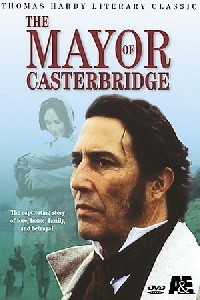
In 1553, clergyman Thomas Snowdell sold his wife to a butcher. After a decree by Queen Mary I, that any clergy who married during the period of Protestantism in the preceding reign, would be put out of their living, it was a straight choice for Thomas, once in which his wife lost out. Indeed since a wife was her husband's property and there were no laws against selling a spouse, it was not an uncommon occurrence (as described in Thomas Hardy's 'The Mayor of Casterbridge.') One shilling was an average price for a wife in the 18th century, as recorded on 31st August 1773 in the toll book of the Bell Inn, Birmingham where it is written;
'Samuel Whitehouse….this day sold his wife, Mary Whitehouse, in the open market to Thomas Griffiths…value 1 shilling. Taken with all her faults.'
 Smithfield Market as it appeared in the 18th century.It was even noted with some alarm (or sarcasm?) in the Times on 22nd July 1797:
Smithfield Market as it appeared in the 18th century.It was even noted with some alarm (or sarcasm?) in the Times on 22nd July 1797:'The increasing value of the fair sex is esteemed by several eminent writers to the certain criterion of increasing civilization…and refined improvement as the price of wives has risen at that market [Smithfield] from half a guinea to three guineas and a half [GBP 294 today!].'
 Smithfield Market in the modern day.
Smithfield Market in the modern day. However it seems some husbands were a little too honest when trying to sell their wives, as was the case in 1832 of farmer Joseph Thomson and his wife of 3 years. He offered her for auction in Carlisle, listing her bad points as 'Born serpent' and 'his tormentor.'Amongst her better features he lists;'She can read novels, milk cows, makes butter and scold the maid…she is a good judge of the quality of rum, gin or whisky from long experience of tasting it.'Thomson wanted 50 shillings (GBP 160 today) but accepted the knock down price of 20 shillings and a Newfoundland dog, which apparently all parties were happy with!
 A Newfoundland dog - a good exchange for a wife?So, if you were going to trade in your spouse - what would you consider a good deal? Leave a comment below and let us know (if you dare!)
A Newfoundland dog - a good exchange for a wife?So, if you were going to trade in your spouse - what would you consider a good deal? Leave a comment below and let us know (if you dare!)
Published on March 16, 2011 08:46
March 13, 2011
Why Black Cats are Lucky....
 As the owner of a black cat, I think they are lucky, but over the centuries their reputation has run the full gamut from being sacred in ancient Egypt, to satanic in medieval Europe.So where did it all start? How did black cats get a reputation for being lucky?
As the owner of a black cat, I think they are lucky, but over the centuries their reputation has run the full gamut from being sacred in ancient Egypt, to satanic in medieval Europe.So where did it all start? How did black cats get a reputation for being lucky?Firstly, let's go back four millennia, to 2,000 BC, and consider how rare black cats were. Wild cats were striped or spotted, to match the dappled sunlight. They originated either in forest environments as existed in the early history of North Africa, or Savannah type environment, which lead to more tawny colored coats. It was only a mutant allele, or gene, that led to the first solid coat such as pure black or white, at the same time as in Egypt black cats were becoming associated with the goddess Isis.
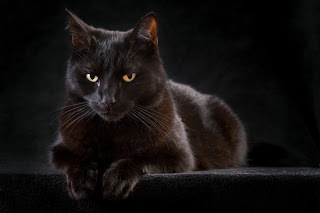
Isis was the goddess of earth's fertility and all living things (also the goddess of ships and sailors but more of this shortly.) She wore a black cloak, to symbolize night – which at the time was associated with calm and gentle love, rather than something demonic. Black cats were said to be the re-incarnation of Isis and revered as sacred.
In Isis' role as protector of ships and sailors, it was a logical step that black cats became the essential good luck charm on a sea voyage. Not only did they control the rodent population, but also invoked Isis' good will on the voyage. In addition, images of cats were carved near the ship's prow, for added luck. This superstition gained such strength that even as late as the 20th century, it was considered bad luck to sail without a ship's cat, and a ship's cat was mandatory on British Royal Naval vessels until 1975!
"A black cat I've heard it said,Can charm all ill awayAnd keep the house wherein she dwells,From fever's deadly sway."
Old English folk poem.
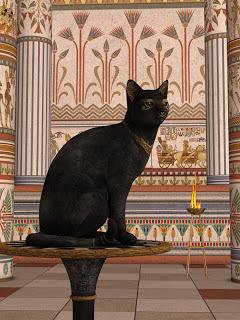
Published on March 13, 2011 07:54
March 9, 2011
Cats in Battle.
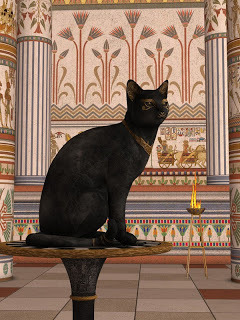 My midweek post is about 'Cats in Battle' and how cats helped the Eygptians win (and also lose!) a battle. The first story is recorded by ancient historian, Herodotus. He writes about an attack on Egypt in 701 by the Assyrians. Now this invasion caught the Egyptians on the hop; they had become lazy and neglected to maintain a well-trained and armed fighting force. The pharaoh, Sethos, wept in despair at the very real fear that his country would be invaded and overrun. But one night he had a dream where the gods told him to be of good cheer and meet the enemy with courage. So Sethos did his best and raised a rag tag army of labourers, artisans and tradesmen. They marched to meet the Assyrian invaders and on the night before battle set up camp in fields close to the invading force. But during the night mice ate through the Assyarians bow strings and shield straps, such that in the morning and unable to defend themselves they fled. And the reason the Egyptian bow strings remained intact? They had taken cats with them to protect their food stores from vermin!
My midweek post is about 'Cats in Battle' and how cats helped the Eygptians win (and also lose!) a battle. The first story is recorded by ancient historian, Herodotus. He writes about an attack on Egypt in 701 by the Assyrians. Now this invasion caught the Egyptians on the hop; they had become lazy and neglected to maintain a well-trained and armed fighting force. The pharaoh, Sethos, wept in despair at the very real fear that his country would be invaded and overrun. But one night he had a dream where the gods told him to be of good cheer and meet the enemy with courage. So Sethos did his best and raised a rag tag army of labourers, artisans and tradesmen. They marched to meet the Assyrian invaders and on the night before battle set up camp in fields close to the invading force. But during the night mice ate through the Assyarians bow strings and shield straps, such that in the morning and unable to defend themselves they fled. And the reason the Egyptian bow strings remained intact? They had taken cats with them to protect their food stores from vermin!
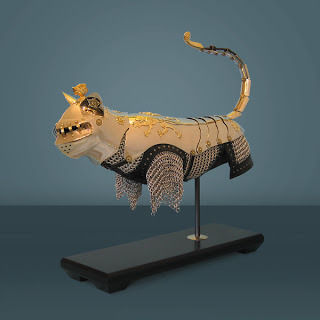 Modern day 'cat armour.' But in another story told by the military writer, Polyaenus, the outcome was very different. He writes of the Persian king, Cambyses, attacking Egypt in 525 BC. Now Cambyses knew that the Egyptians revered certain animals as sacred and so placed rows of cats, dogs and ibis in front of his advancing army. The superstitous Eygptian soldiers, feared to harm the sacred animals and refused to attack. In so doing Cambyses seized the advantage, and was able to take the city and then Egypt!
Modern day 'cat armour.' But in another story told by the military writer, Polyaenus, the outcome was very different. He writes of the Persian king, Cambyses, attacking Egypt in 525 BC. Now Cambyses knew that the Egyptians revered certain animals as sacred and so placed rows of cats, dogs and ibis in front of his advancing army. The superstitous Eygptian soldiers, feared to harm the sacred animals and refused to attack. In so doing Cambyses seized the advantage, and was able to take the city and then Egypt!  The Egyptian goddess, Bastet, nursing kittens.
The Egyptian goddess, Bastet, nursing kittens.
Published on March 09, 2011 11:36
March 7, 2011
"More Power by Tears" - women's rites within marriage.
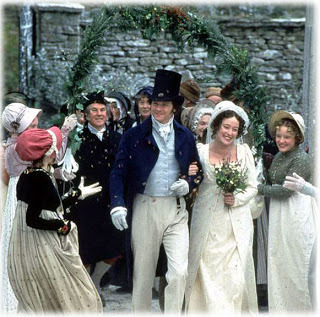 I am an independent woman of the 21st century; a veterinarian by day and author of historical romance by night. I married for love and carried on working, except for a short break when my two sons were born. But in Georgian England, until well into the Victorian era, things were very different and when a woman married she became her husband's property. Any money or property she owned became her husband's.
I am an independent woman of the 21st century; a veterinarian by day and author of historical romance by night. I married for love and carried on working, except for a short break when my two sons were born. But in Georgian England, until well into the Victorian era, things were very different and when a woman married she became her husband's property. Any money or property she owned became her husband's. "…on marriage the husband and wife are one person in law….the very legal existence of the woman is suspended." Sir William Blackstone.
If they had children and the husband abused her such as the marriage broke up, it was the husband who had custody of the children. In law, a married woman was in the same legal category as wards, lunatics, idiots and outlaws!
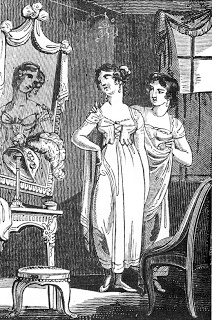
Celeste Armitage, the heroine of my debut novel 'A Dead Man's Debt' is determined not to marry for these very reasons. She longs to travel and determine her own future, which is impossible within the bonds of marriage; especially when it was the attitude of the day that parents decide on an advantageous husband for their daughter. Love had little, if anything to do with it as illustrated in Lord Halifax's advice to his daughter:
"Marriage is too sacred to admit a liberty of objecting to it. You are therefore to make the best of what is settled by law and custom and not vainly imagine that it will be changed for your sake."
Lord Halifax's book 'Advice to a Daughter' first published in 1688, was so popular it ran to 25 editions, featuring other such gems as:
"Men…who are the law-givers…because they have the larger share of reason bestowed upon them."
And
"Women…have more strength in your looks than we have in our laws, and more power by tears, than we have in our arguments."
Is your blood boiling yet?
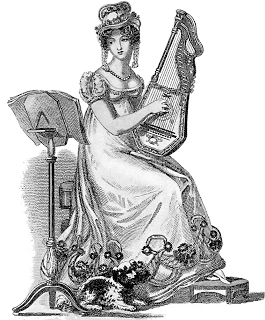
Published on March 07, 2011 13:40
March 6, 2011
Best HISTORICAL ROMANCE 2010 - nomination!
VOTE! VOTE! VOTE!As a new author it's difficult to spread the word about your debut novel which is why I'm especially thrilled that "A Dead Man's Debt" has just been nominated at The Romance Reviews in the categoryBest HISTORICAL ROMANCE - of 2010.I would really appreciate your votes – Simply follow the link and scroll down to the 'Historical Romance' category. 'A Dead Man's Debt' is at the head of the list – simply click 'Vote.'
http://www.theromancereviews.com/bookvote.php
Thank you so much, Grace x

Published on March 06, 2011 01:57
March 3, 2011
More Power by Tears.
 'MORE POWER BY TEARS' Grace is guest blogger over at Night Owl Romance where she posts about the lack of women's rites within marriage during the Regency period. For a chance to win an eBook copy of Grace's 5/5 rated historical romance 'A Dead Man's Debt' simply visit the blog and leave a comment.http://nightowlromanceblog.blogspot.com/2011/03/womens-rites.htmlGood luck!
'MORE POWER BY TEARS' Grace is guest blogger over at Night Owl Romance where she posts about the lack of women's rites within marriage during the Regency period. For a chance to win an eBook copy of Grace's 5/5 rated historical romance 'A Dead Man's Debt' simply visit the blog and leave a comment.http://nightowlromanceblog.blogspot.com/2011/03/womens-rites.htmlGood luck!
Published on March 03, 2011 06:16
March 2, 2011
The Matter of the Dead.
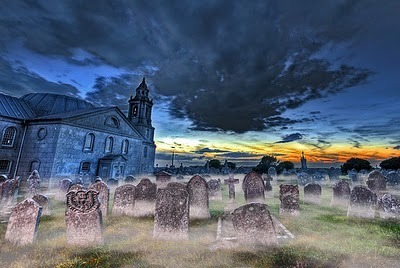 The English parish church and graveyard is a scene that sums up rural English life. Entered by a lych gate you walk along a narrow path with graves on either side, to enter the church by a porch. Around the church the ground rises gently around it, a bit like a weight placed on a cushion. But have you ever wondered why old English churches nestle into the landscape this way? Is it a matter of centuries of subsidence, or is there some other explanation?
The English parish church and graveyard is a scene that sums up rural English life. Entered by a lych gate you walk along a narrow path with graves on either side, to enter the church by a porch. Around the church the ground rises gently around it, a bit like a weight placed on a cushion. But have you ever wondered why old English churches nestle into the landscape this way? Is it a matter of centuries of subsidence, or is there some other explanation? In truth it is not the churches that are sinking but the ground that is rising up. The reason? The dead are rising!In previous centuries the typical English parish had around 250 to 500 people listed in its records. So for each century that passed, this meant around 1,000 to 2,000 deaths, the vast majority of whom would be buried in the parish church yard (plus stillborn babies and children who died in infancy who wouldn't have been counted amongst members of the parish) So for an average Norman church dating back to the 1100's, that meant that a conservative estimate of the number of burials in the church yard would have been 10,000 to 20,000. In fact what is happening is that the church is on the original ground level and all those buried bodies add matter to the graveyard and which over the centuries raises the earth.
In truth it is not the churches that are sinking but the ground that is rising up. The reason? The dead are rising!In previous centuries the typical English parish had around 250 to 500 people listed in its records. So for each century that passed, this meant around 1,000 to 2,000 deaths, the vast majority of whom would be buried in the parish church yard (plus stillborn babies and children who died in infancy who wouldn't have been counted amongst members of the parish) So for an average Norman church dating back to the 1100's, that meant that a conservative estimate of the number of burials in the church yard would have been 10,000 to 20,000. In fact what is happening is that the church is on the original ground level and all those buried bodies add matter to the graveyard and which over the centuries raises the earth. 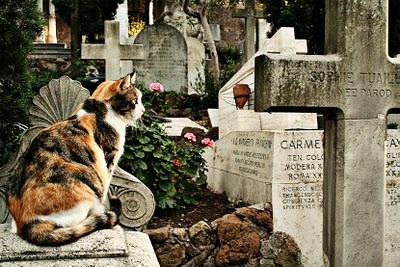
Published on March 02, 2011 12:03
February 27, 2011
"FOR LOVE is NEW" - by Jean Hart Stewart. Guest Blogger.
A big welcome today to fellow Regency author, Jean Hart Stewart! I'm so excited to have another historical romance author visiting...and an animal lover to boot! I hope you enjoy Jean's post and please leave a comment at the end. Grace x
 Author -Jean Hart Stewart.
Author -Jean Hart Stewart.
Asking me to write about the Regency period is like opening the flood gates, so beware! I purely love the Regency period and everything about it. Clothes, language, the prissy morals demanded of the women (as least the so-called good women) and the passions boiling under the surface. Men definitely didn't have to follow the same rules, while a woman was ostracized for the slightest misstep.
I got hooked on Pride and Prejudice when I was fourteen and it's still my favorite book of all time. I've collected copies through the years, whenever I could find one I craved in a used or new book store and have a few whose illustrations are gorgeous. They're my treasures, and I can hardly wait 'til my granddaughter, now 11, is old enough to appreciate them.
So I love to write about that period. Not only the people, but their love of animals fascinate me. Dogs, cats, and horses romp through the books. In For Love is New, an influential character is the dog, Boney. He's shown on the book cover, since he's so important to the plot. He's named Boney because he latched onto the hero and followed him home from Marleybone Park. His name causes complications, since the very dastardly villain thinks it's a derogatory nickname for his man he adores, Napoleon, and is one of the reasons he lets his cruelty lose on the hero and heroine.
Wellington is probably the best known hero of that era. Studying his life was a revelation to me. When he was younger his mother thought him hopeless, and publicly stated she expected nothing of poor Arthur. His family sent him to India to get him out of the way. While there he started on the road to eclipsing his other successful brothers and becoming a Duke. He married too young and out of a mistaken feeling of obligation to a girl he never truly loved. As a result, although he had two sons, he quite publicly displayed a long list of gorgeous mistresses. Since he was Wellington, and living in that time of men getting away with almost anything, it didn't matter.
His wife played on his sense of duty to get him to marry her. I wonder if she ever regretted it.
A fascinating time period. Do ask me any questions you have. I'd love to answer them…

"For Love is New" - blurb.
Lord Christian Cherne, recently invalided out of the Penninsular Army, is looking forward to the pleasures of London. He has one duty to discharge before he searches for a mistress. He must offer his protection to Lady Juliet Sloan. Paul Sloan was killed in battle, leaving Christian a horrifying letter of his sadistic treatment at the hands of Roger Gullis. To his dismay, Christian finds Gullis sitting in Lady Juliet's parlor when he comes to call. All his plans must now concentrate on keeping Juliet safe. Christian further suspects Gullis of being a traitor and his fears for Juliet increase.
Juliet is attracted, but suspicious of which man is the traitor. As attraction between Juliet and Christian grows, Gullis turns cruelly vengeful.
Will Juliet and Christian be able to thwart Gullis' plans to help bring Napoleon back to power, even as he finds wicked retribution for his rejection by the two lovers he has come to hate?
"For Love is New" - excerpt.
London, January 2, 1815
"You're as antsy as a debutante at her first ball, Christian. What in bloody hell is wrong with you?"Christian threw his best friend an apologetic smile."I've spent three dammed days at the War Ministry and finally agreed to take an occasional job for them. I didn't want to do even that. I don't want to be tied down in any way. Any way at all. And now I must fulfill one last unwanted obligation and call on a certain Miss Juliet Sloan."Delaney whistled long and low. "Not really a hardship, my friend. I've never met her, but she's reputed to be a beauty."Christian snorted. "I don't care about getting tied up with a virtuous woman, Delaney, no matter how beautiful. All during this damnable war I dreamed about getting home. I want to start living the life of a carefree bachelor, and all I get is more obligations thrown at me. I want to sample every wicked pleasure London has to offer. Virtuous women are not on the list."Delaney laughed out loud at this uncharacteristic outburst."Satan's bones, but you're really stirred, aren't you? Make your damned duty call and get it over with. Thank you so much Jean, for joining us here today. 'For Love is New' sounds just my sort of read and I wish you every success. Reading about 'Boney' I just could help posting this cute shaggy dog photo above - forgive the indulgence but he's just so cute!As Jean said she'd love to share her love of the era so if you have any comments please leave them below. Kind regards, Grace x
Thank you so much Jean, for joining us here today. 'For Love is New' sounds just my sort of read and I wish you every success. Reading about 'Boney' I just could help posting this cute shaggy dog photo above - forgive the indulgence but he's just so cute!As Jean said she'd love to share her love of the era so if you have any comments please leave them below. Kind regards, Grace x

 Author -Jean Hart Stewart.
Author -Jean Hart Stewart.Asking me to write about the Regency period is like opening the flood gates, so beware! I purely love the Regency period and everything about it. Clothes, language, the prissy morals demanded of the women (as least the so-called good women) and the passions boiling under the surface. Men definitely didn't have to follow the same rules, while a woman was ostracized for the slightest misstep.
I got hooked on Pride and Prejudice when I was fourteen and it's still my favorite book of all time. I've collected copies through the years, whenever I could find one I craved in a used or new book store and have a few whose illustrations are gorgeous. They're my treasures, and I can hardly wait 'til my granddaughter, now 11, is old enough to appreciate them.
So I love to write about that period. Not only the people, but their love of animals fascinate me. Dogs, cats, and horses romp through the books. In For Love is New, an influential character is the dog, Boney. He's shown on the book cover, since he's so important to the plot. He's named Boney because he latched onto the hero and followed him home from Marleybone Park. His name causes complications, since the very dastardly villain thinks it's a derogatory nickname for his man he adores, Napoleon, and is one of the reasons he lets his cruelty lose on the hero and heroine.
Wellington is probably the best known hero of that era. Studying his life was a revelation to me. When he was younger his mother thought him hopeless, and publicly stated she expected nothing of poor Arthur. His family sent him to India to get him out of the way. While there he started on the road to eclipsing his other successful brothers and becoming a Duke. He married too young and out of a mistaken feeling of obligation to a girl he never truly loved. As a result, although he had two sons, he quite publicly displayed a long list of gorgeous mistresses. Since he was Wellington, and living in that time of men getting away with almost anything, it didn't matter.
His wife played on his sense of duty to get him to marry her. I wonder if she ever regretted it.
A fascinating time period. Do ask me any questions you have. I'd love to answer them…

"For Love is New" - blurb.
Lord Christian Cherne, recently invalided out of the Penninsular Army, is looking forward to the pleasures of London. He has one duty to discharge before he searches for a mistress. He must offer his protection to Lady Juliet Sloan. Paul Sloan was killed in battle, leaving Christian a horrifying letter of his sadistic treatment at the hands of Roger Gullis. To his dismay, Christian finds Gullis sitting in Lady Juliet's parlor when he comes to call. All his plans must now concentrate on keeping Juliet safe. Christian further suspects Gullis of being a traitor and his fears for Juliet increase.
Juliet is attracted, but suspicious of which man is the traitor. As attraction between Juliet and Christian grows, Gullis turns cruelly vengeful.
Will Juliet and Christian be able to thwart Gullis' plans to help bring Napoleon back to power, even as he finds wicked retribution for his rejection by the two lovers he has come to hate?
"For Love is New" - excerpt.
London, January 2, 1815
"You're as antsy as a debutante at her first ball, Christian. What in bloody hell is wrong with you?"Christian threw his best friend an apologetic smile."I've spent three dammed days at the War Ministry and finally agreed to take an occasional job for them. I didn't want to do even that. I don't want to be tied down in any way. Any way at all. And now I must fulfill one last unwanted obligation and call on a certain Miss Juliet Sloan."Delaney whistled long and low. "Not really a hardship, my friend. I've never met her, but she's reputed to be a beauty."Christian snorted. "I don't care about getting tied up with a virtuous woman, Delaney, no matter how beautiful. All during this damnable war I dreamed about getting home. I want to start living the life of a carefree bachelor, and all I get is more obligations thrown at me. I want to sample every wicked pleasure London has to offer. Virtuous women are not on the list."Delaney laughed out loud at this uncharacteristic outburst."Satan's bones, but you're really stirred, aren't you? Make your damned duty call and get it over with.
 Thank you so much Jean, for joining us here today. 'For Love is New' sounds just my sort of read and I wish you every success. Reading about 'Boney' I just could help posting this cute shaggy dog photo above - forgive the indulgence but he's just so cute!As Jean said she'd love to share her love of the era so if you have any comments please leave them below. Kind regards, Grace x
Thank you so much Jean, for joining us here today. 'For Love is New' sounds just my sort of read and I wish you every success. Reading about 'Boney' I just could help posting this cute shaggy dog photo above - forgive the indulgence but he's just so cute!As Jean said she'd love to share her love of the era so if you have any comments please leave them below. Kind regards, Grace x
Published on February 27, 2011 10:21
February 24, 2011
The Pen and Muse - latest review!
Another awesome review for 'A Dead Man's Debt' - this time from the Pen and Muse.
Read the extract below or follow the link for the full post.
This was a story that from start to finish drew you in and kept you wanting to know what happened next. Elliot certainly writes like she knows the time and will have you enthralled with it. There is love, intrigue, and certainly danger in this one. So get ready to be up all night reading this one ladies,
http://thepenmuse.net/archives/2268

Read the extract below or follow the link for the full post.
This was a story that from start to finish drew you in and kept you wanting to know what happened next. Elliot certainly writes like she knows the time and will have you enthralled with it. There is love, intrigue, and certainly danger in this one. So get ready to be up all night reading this one ladies,
http://thepenmuse.net/archives/2268

Published on February 24, 2011 12:53
•
Tags:
a-dead-man-s-debt, grace-elliot, the-pen-and-muse
February 23, 2011
Whistler's Poodle and the Eminent Surgeon.
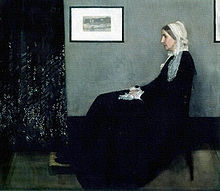 'Whistler's Mother.'American born, British based artist, James Abbott Whistler (1834 - 1903) famed for paintings such as 'Arrangement in Grey and Black, the Artist's Mother' (yes, the picture in the first Mr. Bean movie!) and Old Battersea Bridge, was an animal lover. Whistler owned a tortoiseshell cat, but his favorite pet was actually his French poodle.
'Whistler's Mother.'American born, British based artist, James Abbott Whistler (1834 - 1903) famed for paintings such as 'Arrangement in Grey and Black, the Artist's Mother' (yes, the picture in the first Mr. Bean movie!) and Old Battersea Bridge, was an animal lover. Whistler owned a tortoiseshell cat, but his favorite pet was actually his French poodle.  One day the poodle was taken ill and in a panic Whistler called out an eminent ENT surgeon of the day. Arriving at Whistler's address, the distinguished doctor was horrified to find the patient wasn't human but canine! Begrudgingly he examined the animal and prescribed a course of treatment. But the next day the doctor got his revenge when he sent Whistler an urgent summons. Thinking it was news of his favorite dog's condition the great artist dropped everything and hurried over. He was greeted warmly by the doctor with the words; 'Ah good morning Mr. Whistler, so good of you to call so promptly. I needed to see you urgently about the repainting my front door.'
One day the poodle was taken ill and in a panic Whistler called out an eminent ENT surgeon of the day. Arriving at Whistler's address, the distinguished doctor was horrified to find the patient wasn't human but canine! Begrudgingly he examined the animal and prescribed a course of treatment. But the next day the doctor got his revenge when he sent Whistler an urgent summons. Thinking it was news of his favorite dog's condition the great artist dropped everything and hurried over. He was greeted warmly by the doctor with the words; 'Ah good morning Mr. Whistler, so good of you to call so promptly. I needed to see you urgently about the repainting my front door.' 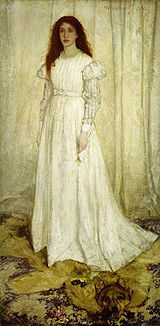 'Study in White' by Whistler
'Study in White' by Whistler
Published on February 23, 2011 11:57
'Familiar Felines.'
Following on from last weeks Halloween posting, today's blog post looks at the unwanted image of cats as the witches familiar - from the Norse Goddess Freya to lonely women in the middle ages.
The full Following on from last weeks Halloween posting, today's blog post looks at the unwanted image of cats as the witches familiar - from the Norse Goddess Freya to lonely women in the middle ages.
The full post can found at:
http://graceelliot-author.blogspot.com
...more
The full Following on from last weeks Halloween posting, today's blog post looks at the unwanted image of cats as the witches familiar - from the Norse Goddess Freya to lonely women in the middle ages.
The full post can found at:
http://graceelliot-author.blogspot.com
...more
- Grace Elliot's profile
- 156 followers



